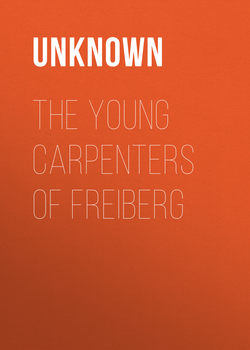Читать книгу The Young Carpenters of Freiberg - Unknown - Страница 4
На сайте Литреса книга снята с продажи.
CHAPTER IV.
THE ENEMY BEFORE THE TOWN
ОглавлениеThe tower of St. Peter's Church rises high into the air above all the other buildings of Freiberg. In those early days church-towers were too often used for purposes with which religion had but little to do. Grim cannon sometimes stood there, not to fire harmless salutes on days of public rejoicing, but more often to be loaded with deadly missiles and fired at an enemy. Thus it happened that one of these instruments of death had been planted in the highest chamber of the St. Peter's Tower at Freiberg. Round this cannon, on December 27, 1642, stood Burgomaster Jonas Schönleben and several others, among whom were Hillner the journeyman, and the town servant Jüchziger. Winter had come in all its might, and the cold, particularly up here in the windy tower, was very severe, while snow lay deep over all the surrounding landscape. The eyes of those present were intently gazing beyond the town, to where, on the hill above the Hospital Church, many cavalry soldiers could be seen moving about and beginning to take up their positions. There had been a good deal of doubt expressed in the town as to whether the Swedish commander really meant to undertake a siege up there among the mountains at such an inclement season, with snow lying thickly on the frozen ground. The appearance of these horsemen and their business-like movements seemed to set such doubts at rest once for all.
'Respected Herr Burgomaster,' began Jüchziger, 'in my humble opinion those soldiers are not Swedes at all, but Imperialists who have reached us from Bohemia before the enemy had time to come up. I should think Marshal Piccolomini has sent them to frighten the Swedes into leaving the city alone.'
'What we ardently wish we soon believe,' and Jüchziger's speech found favour with the Burgomaster no less than with his other hearers. Hillner alone said respectfully but firmly, 'Herr Burgomaster, they are Swedes beyond the possibility of doubt. I know them well; they are Diedemann's dragoons.'
'And how may you happen to know that, young man?' asked Schönleben gloomily.
'Because—well, in fact, because I once served among the Swedes myself,' replied Hillner.
'What!' cried Schönleben in astonishment; 'you a Swede, and here in Freiberg!'
'I crave your pardon, Herr Burgomaster,' returned Hillner. 'By this time very few in the Swedish army are really Swedes at all; they are men gathered in from all nations—not a few of them from Saxony itself. Many a citizen and countryman too has been driven by starvation to take up the hard life of a soldier just to get the means of keeping body and soul together. Others have been dragged by force into the Swedish ranks, as I was. I only served one year, the year in which General Bannier laid siege to Freiberg. I was wounded in the course of that siege, taken prisoner, and brought into the city, and being recognised for a Saxon born and bred, I was allowed to return to my trade. I am just about to become a master carpenter, and have already applied to be enrolled among the citizens.'
'Your name?'
'John Hillner of Struppen, near Pirna. Might I entreat your worship's gracious influence on my behalf?'
'I am not yet acting-Burgomaster,' replied Schönleben rather shortly. 'You must make your application to my brother in office, Burgomaster Richzenhayn.'
'But your worship will be in office in two or three days,' persisted Hillner, in a tone of entreaty. 'And when you are so, let me beg you kindly to remember my request.'
'I'll take good care to see all about that,' muttered Jüchziger to himself. 'And thank you, Master Shavings, for giving me a handle to catch hold of you by.'
